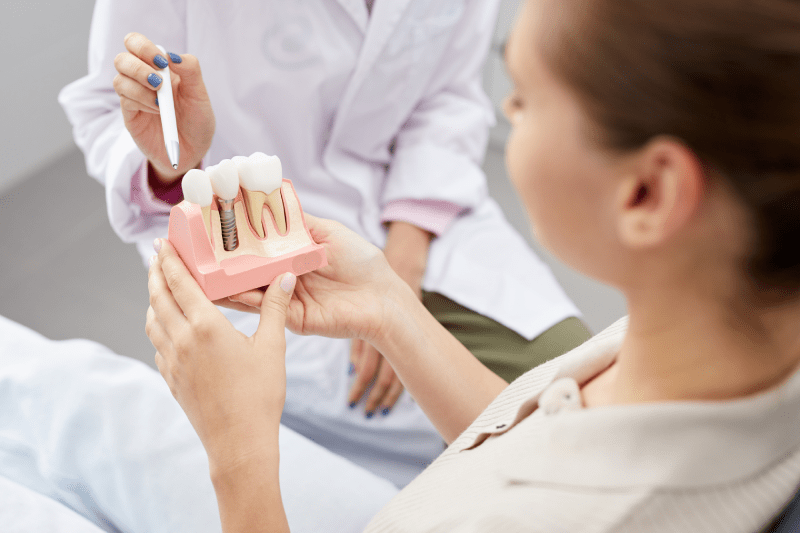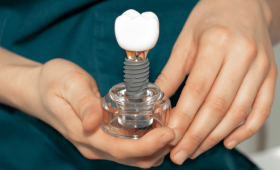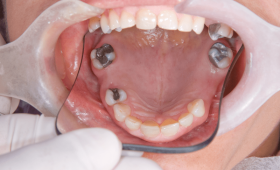What Are Full-Mouth Dental Implants?
Full-mouth dental implants are a comprehensive dental restoration treatment where all the teeth in one or both jaws are replaced with a fixed prosthesis placed on a limited number of dental implants (usually between 4 and 8). This system allows a few strategically placed implants to support the entire bridge, rather than placing individual implants for each tooth. It is generally ideal for patients who have lost all their teeth or whose remaining teeth need to be extracted. Unlike traditional removable dentures, this system is a permanent and highly comfortable solution that completely restores chewing function, speech, and aesthetic appearance.
Types of Full Mouth Dental Implants
Full mouth dental implants are a permanent solution applied to patients who have lost all their teeth. These treatments significantly improve patients’ quality of life by providing an aesthetic smile and natural chewing function. The main types of implants used for full mouth restoration are as follows:
All-on-4 and All-on-6 Implants
These techniques are among the most preferred methods in cases of complete edentulism (total tooth loss). As the name suggests, they allow for the restoration of the entire dental arch with a fixed prosthesis using 4 or 6 implants in a single jaw.
- Advantages:
- The cost and treatment time are shorter since fewer implants are used.
- It requires less bone volume compared to conventional implants, which can eliminate the need for bone grafting.
- A temporary prosthesis can be fitted in a single session, allowing the patient to leave the clinic with teeth on the same day.
- Who It Is Suitable For?
- Patients with sufficient bone density or limited bone loss.
- Those looking for a fast and functional solution.
Zygoma Implants
Zygoma (cheekbone) implants are a method developed for patients with severe bone loss in the upper jaw. In cases where conventional implants cannot be placed, these longer implants are directly inserted into the cheekbone.
- Advantages:
- Allows for prosthesis application even in severe bone loss cases.
- Eliminates the need for additional surgical procedures like bone grafting.
- The treatment period is shorter.
- Who It Is Suitable For?
- Patients with extreme bone resorption in the upper jaw.
- Those who do not want to undergo bone grafting surgery.
Conventional Implants (Individual Implants)
In this method, a separate implant is placed for each missing tooth space. For a full mouth restoration, 8 to 10 implants can be applied per jaw. Crowns or bridges are then placed on these individual implants.
- Advantages:
- Provides the most natural-looking restoration of teeth.
- The stability and chewing power of the prosthesis are very high.
- Offers a more flexible treatment plan compared to other methods.
- Who It Is Suitable For?
- Patients with sufficient bone volume and density.
- Those who are not constrained by budget or time and are looking for the most natural solution.
Hybrid Dentures (Bar-Supported Fixed Dentures)
Hybrid dentures are fixed prostheses that are typically placed on 4 to 6 implants and supported by a metal bar. They are called “hybrid” because their structure contains both acrylic and metal.
- Advantages:
- Ensures the strength and durability of both the implants and the prostheses.
- Easy to clean and maintain.
- Can be applied in conjunction with systems like All-on-4.
- Who It Is Suitable For?
- Patients suitable for All-on-4 or All-on-6 systems.
- Those looking for a natural appearance and strong chewing function.
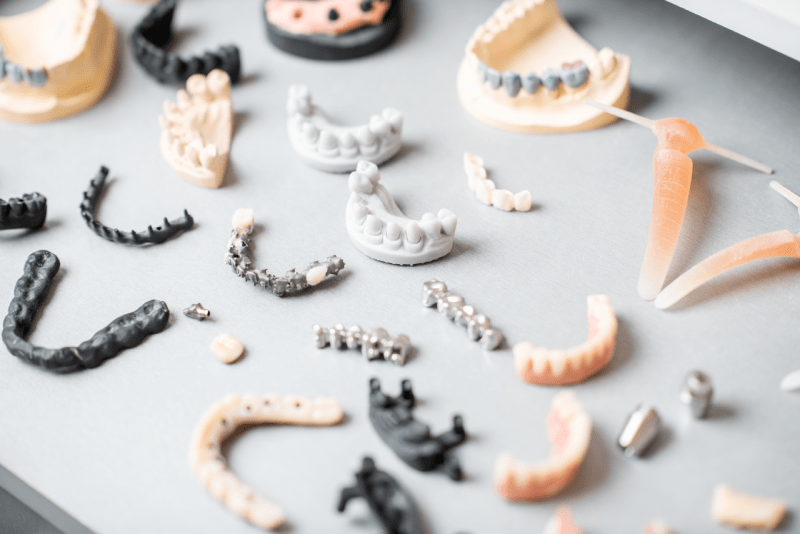
Who Are Full-Mouth Dental Implants Suitable For?
This comprehensive treatment is generally suitable for patients in the following conditions. Your dentist will conduct a detailed evaluation to determine your suitability before starting the treatment:
- Complete Tooth Loss or Approaching Loss: It is the best solution for patients who have lost all their teeth or whose remaining teeth need to be extracted due to severe decay, periodontal disease, or trauma.
- Sufficient Bone Density: Having sufficient bone volume and density is critical for the implants to integrate firmly with the jawbone. Insufficient bone may require additional surgical procedures like bone grafting or sinus lifting.
- Overall Health Status: The patient’s overall health status must be suitable to safely undergo a surgical operation. Conditions such as uncontrolled diabetes, certain heart conditions, or autoimmune diseases can make the treatment risky and require prior medical consultation.
- Dissatisfaction with Traditional Dentures: It is an excellent alternative for those who are bothered by problems like slipping dentures, mouth sores, or difficulty chewing with traditional removable prostheses and are looking for a more stable solution.
- Good Oral Hygiene Habits: The long-term success of the treatment depends on the patient’s commitment to maintaining regular and effective oral hygiene, as well as attending regular dental check-ups.
Recovery Process and Care Recommendations After Implant Surgery
The recovery process after implant surgery largely completes within the first few weeks. However, the full fusion of the implants with the jawbone (osseointegration) generally takes 3 to 6 months. To accelerate recovery and increase success during this period, the following recommendations must be followed:
- First 24 Hours: Immediately after the procedure, apply a cold compress to the surgical area for the first 24 hours to minimize swelling. This is very effective in preventing swelling and bruising. Also, avoid very hot or cold foods and drinks on the day of the surgery.
- Nutrition: For the first few days, consume only soft and liquid foods (such as yogurt, soup, purees). Absolutely stay away from hard, crunchy, or spicy foods that could irritate the surgical site. Using a straw should also be avoided as it can cause bleeding at the wound site.
- Oral Hygiene: Do not brush or gargle for the first 24 hours after surgery. After 24 hours, maintain oral hygiene by using a special mouthwash recommended by your dentist several times a day. Avoid brushing the surgical area directly, but you can continue to brush your other teeth gently.
- Medication: Take all antibiotics and painkillers prescribed by your dentist regularly and as directed by your doctor. This reduces the risk of infection and keeps pain under control.
- Smoking and Alcohol: Smoking and alcohol consumption severely slow down wound healing and increase the risk of infection. Therefore, they must be avoided completely during the recovery process.
How Permanent Are Full-Mouth Implants?
Full-mouth implants, due to their titanium composition and permanent integration with the jawbone, can last a lifetime with proper oral care and regular dental check-ups. The implant itself, once integrated with the bone, does not move. However, the dental prostheses placed on top of the implants may wear down, chip, or get damaged over time. The lifespan of these prostheses varies depending on the materials used and the patient’s chewing habits; they generally may need to be replaced after 10-15 years. Regular check-ups and professional cleanings are of great importance for the longevity of the implants.
Is Dental Implant Treatment Painful?
Contrary to popular belief, dental implant treatment is generally not a painful procedure. The treatment is performed under local anesthesia, so no pain is felt during the procedure. If the patient is very anxious or a more complex surgery is required, sedation or general anesthesia can also be used. A slight pain and swelling after the procedure, once the anesthetic wears off, is normal. This can be easily managed with simple painkillers recommended by your dentist. Most patients describe the implant operation as a discomfort similar to a tooth extraction and state that the pain is much less than they expected.
How much is a full set of all on 4 implants In Turkey?
Cost of All-on-4 Implants in Turkey
The cost of a full set of All-on-4 dental implants in Turkey can vary significantly depending on several factors, but it is generally a fraction of the price in Western countries like the UK or the USA. The term “full set” typically refers to one arch (either upper or lower jaw). If you require both arches, the cost would be double.
Average Price Range
Based on recent data, the average cost for one arch of All-on-4 implants in Turkey typically falls within these ranges:
- Euros (€): €3,000 – €8,000
- British Pounds (£): £3,200 – £6,000
- US Dollars ($): $3,000 – $9,000
These prices are often part of an “all-inclusive” package, which can provide significant value.
What is Typically Included in the Package?
Many clinics in Turkey offer comprehensive packages to attract international patients. These packages commonly include:
- The Procedure: Surgical placement of the four implants.
- Prosthesis: A temporary bridge or dentures to be worn while the implants heal, followed by the final, permanent set of teeth (porcelain or zirconia crowns).
- Consultation & Diagnostics: Initial consultations, panoramic X-rays, and 3D CT scans.
- Transportation: VIP airport and hotel transfers.
- Accommodation: In some cases, a certain number of nights in a hotel.
Factors That Influence the Price
Several variables can cause the price to be at the higher or lower end of the spectrum:
- Implant Brand: The brand of implants used is one of the biggest factors. Premium, internationally recognized brands like Straumann or Nobel Biocare will be more expensive than local or less well-known brands.
- Prosthesis Material: The material for your final teeth affects the cost. Zirconia crowns are generally more durable and aesthetic, and therefore more expensive than acrylic or porcelain options.
- Additional Procedures: Some patients may require extra work before the implants can be placed, which will add to the total cost. This includes procedures like bone grafting or a sinus lift if there is not enough jawbone to support the implants.
- Clinic Reputation and Location: The price can vary based on the clinic’s reputation, the dentist’s experience, and the city in which it is located. Clinics in major cities like Istanbul or Antalya may have different pricing models than those in smaller towns.
How much is a full set of all on 6 implants In Turkey?
Cost of a Full Set of All-on-6 Dental Implants in Turkey
The price of a full set of All-on-6 dental implants in Turkey generally ranges from €6,000 to €12,000 or approximately $6,600 to $13,200. It’s important to note that these figures are per jaw, and the total cost for a full mouth (both upper and lower jaws) would be a multiple of this amount. Prices can also be quoted in GBP, with a typical range of £6,600 to £9,800.
Factors Influencing the Price
The final cost can vary significantly based on a number of factors, including:
- Clinic and Location: Prices can differ between clinics, and those in major cities like Istanbul or Antalya may have a different cost structure than those in smaller towns.
- Implant Brand: The brand of implants used is a major factor. Reputable, well-known brands like Straumann®, Nobel Biocare®, or Astra Tech® will be more expensive than local or less-known brands.
- Prosthesis Material: The type of material used for the final prosthetic bridge (the “teeth”) also impacts the price. Zirconium crowns are generally more expensive than porcelain.
- Inclusions in the Package: Many clinics offer all-inclusive packages that can significantly affect the total price. These packages often include:
- Consultation and panoramic x-rays
- The implants and abutments
- Temporary dentures
- The final prosthetic bridge
- Hotel accommodation
- VIP airport and local transfers
- Post-operative care and check-ups
Why are the costs lower in Turkey?
The lower cost of dental work in Turkey is primarily due to lower operational costs, including labor and facility expenses, as well as a favorable exchange rate. This allows clinics to offer high-quality treatment at a fraction of the cost found in countries like the UK, USA, or Germany.
Additional Costs to Consider
While many packages are comprehensive, you should budget for:
- Flights: These are generally not included in the package price.
- Surgical Procedures: Additional procedures like bone grafts or sinus lifts, if needed, are often not included in the initial quote and will add to the total cost.
- Food and Personal Expenses: Daily living expenses during your stay.
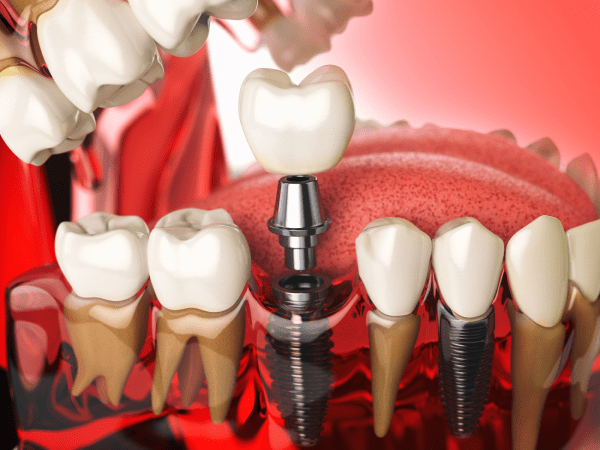
Advantages and Disadvantages of Full-Mouth Implants
Advantages:
- Natural Appearance and Function: Implants look and feel like natural teeth. They fully restore your ability to speak and chew, which leads to a significant increase in quality of life.
- High Chewing Power: Unlike traditional removable dentures, implant-supported prostheses are much more stable, so you can chew even harder foods with ease.
- Prevents Bone Loss: Tooth loss prevents stimulation of the jawbone, leading to bone resorption. Implants act like natural tooth roots by applying pressure to the jawbone, which stops bone loss.
- Permanent and Reliable: Implants are a fixed solution that does not move in the mouth and does not require additional adhesives. This increases your self-confidence in social life and daily activities.
- Comfort and Hygiene: Unlike with removable dentures, there are no issues with mouth sores or bad odors. Oral hygiene is easily maintained with a toothbrush and dental floss.
Disadvantages:
- High Cost: Full-mouth implants are a more costly investment than traditional dentures due to the materials used and the surgical procedures.
- Surgical Procedure: It requires at least one surgical operation. Although these operations are safe, this can be a disadvantage for patients with a fear of surgery or those whose overall health status is not suitable.
- Long Treatment Process: The completion of the treatment can take several months due to the waiting period (3-6 months) for the implants to fuse with the bone.
- Suitability: Not every patient is suitable for implant treatment. Insufficient bone volume or certain systemic diseases can make the treatment impossible or more complex.
What Are the Dental Prosthesis Materials Used in the Package?
The dental prosthesis (dental bridge) materials used in full-mouth implant packages vary in terms of aesthetics and durability:
- Acrylic (PMMA): It is a more economical and lightweight material, generally used for temporary prostheses. It can be prepared quickly. Although its aesthetics are limited, it provides the patient with a chewing and aesthetic solution during the healing process.
- Zirconia: It is one of the most popular and aesthetic materials. It is known for its high durability, biocompatibility, and translucent structure resembling natural teeth. It is highly resistant to chewing forces and is a long-lasting solution.
- Porcelain: It provides the closest aesthetics and light transmission to natural teeth. It can be preferred for an excellent appearance, especially in the front teeth. However, it is more brittle than zirconia and has a higher risk of fracture if exposed to high chewing pressure in the back teeth.
- Hybrid Prostheses (Metal-Acrylic): These are prostheses with an acrylic tooth structure on a metal framework, which are screwed onto the implants. They combine both durability and aesthetics. They are easy to repair and maintain.
Which Dental Prosthesis Material Should I Prefer?
The choice of material depends on your personal budget, aesthetic expectations, chewing habits, and your dentist’s recommendations.
- Zirconia: If you are looking for a long-lasting, durable, and aesthetically pleasing solution, zirconia is the ideal choice. It is suitable for both front and back teeth.
- Porcelain: If aesthetic appearance is the most important criterion for you and you are getting a prosthesis for an area with less chewing force, porcelain can be a good option.
- Acrylic: It can be preferred if you are looking for a budget-friendly, lightweight solution and especially if you plan to use it as a temporary prosthesis.
A detailed consultation with your dentist will help you determine which material is most suitable for you.
Differences Between All-on-4, All-on-6, and All-on-8 Implant Systems
These implant systems are named according to the number of implants used to replace all teeth in one jaw with a fixed prosthesis. Each system has its own advantages, and the most suitable one is determined on a case-by-case basis:
- All-on-4: This system involves placing only four implants in a single jaw to replace all teeth with a fixed prosthesis. This system eliminates the need for bone grafting, especially in patients with insufficient bone volume, by placing the posterior implants at an angled position. It offers a faster and less invasive solution.
- All-on-6: It provides more support and stability by using six implants. It may be preferred, especially in the upper jaw with a softer bone structure or in cases requiring more chewing power. Six implants distribute the load on the prosthesis over a larger area, offering greater security in the long run.
- All-on-8: It provides the highest level of support and strength by using eight implants. It is generally recommended for patients with a greater bone volume who desire maximum durability and stability. It is one of the most robust and long-lasting systems.
Single Jaw Full-Mouth Implant Package vs. Double Jaw Package
- Single Jaw Package: This includes the replacement of teeth in only the lower or upper jaw. It is a suitable solution for patients who have tooth loss issues in only one jaw.
- Double Jaw Package: This includes the replacement of all teeth with implants in both the lower and upper jaws. A double jaw package has a more comprehensive treatment plan and a higher cost than a single jaw package, but it offers the advantage of solving all oral health and aesthetic issues with a single plan.
Full-Mouth Implant Application Process: A Step-by-Step Guide
- Initial Examination and Planning: This is the most critical stage of the treatment. Your dentist will perform a detailed analysis of your mouth and jaw structure using advanced imaging methods such as 3D tomography and panoramic x-rays. The location and number of implants to be placed, the design of the prosthesis, and the entire treatment process are meticulously planned.
- Tooth Extraction and Implant Placement: All necessary teeth are extracted. In the same session or later, the planned number of implants are placed in the jawbone. This stage is a procedure that requires surgical precision.
- Healing Process: A period of several months is awaited for the implants to fuse with the jawbone (osseointegration). This process is crucial for the success of the treatment. During this waiting period, a temporary prosthesis is given to the patient to meet their aesthetic and functional needs.
- Preparation of Permanent Prostheses: Once healing is complete, precise impressions of the mouth are taken. Based on these impressions, custom-made permanent prostheses are prepared in the laboratory.
- Placement of Prostheses: The prepared permanent prostheses are screwed onto the implants and fixed. Final checks are made, and the patient can begin to enjoy the comfort and aesthetics of their new teeth.
Evaluation of Mouth and Jaw Structure: What to Do Before the Package
Before purchasing the package, a detailed examination and evaluation with your dentist are essential. During this evaluation, your dentist will not only check your bone density but also:
- The general condition of your oral hygiene,
- The health of your gums,
- The location of sinuses and important nerves in the jaw,
- Any existing dental diseases (periodontal diseases, etc.),
- Whether you need additional surgical procedures like bone grafting or sinus lifting. All these analyses form the basis for creating the most suitable and successful treatment plan for you.
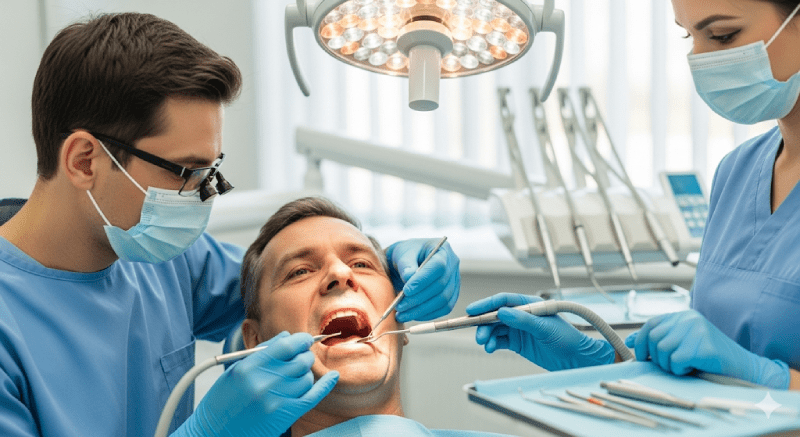
Why Should You Prefer an All-Inclusive Package?
All-inclusive packages greatly simplify the financial and logistical process of implant treatment. These packages cover all steps, from the initial examination to the permanent prostheses, eliminating the risk of unexpected costs. Since the total cost and scope of the treatment are clear from the beginning, it becomes easier to plan financially and you do not have to deal with additional payments throughout the treatment process. This transparent structure allows the patient to focus on the treatment and experience less stress.
What Is Included in the Package Price?
An all-inclusive full-mouth implant package generally includes:
- Comprehensive initial examination, digital imaging (x-ray and tomography).
- Necessary tooth extractions and surgical operation.
- Dental implants and abutment pieces to be placed.
- Temporary prostheses to be used during the healing process.
- Custom-made permanent prostheses to be placed at the end of the treatment.
- Anesthesia, all surgical materials, and medications.
- All control examinations and necessary adjustments made during the recovery process.
- Some packages may also offer a material warranty for a certain period.
What to Consider When Choosing a Package: Material Quality and Expertise
- Material Quality: The quality of the implant and prosthesis materials used is vital for the longevity of your treatment. Pay attention to whether the implant brands used by the clinic are internationally recognized and certified. Cheap and low-quality materials can lead to complications later on.
- Dentist and Clinic Expertise: The success of implant treatment directly depends on the experience of the dentist and the technological competence of the clinic. Research the dentist’s experience in the field of implantology, their success rates, and patient reviews. Remember that this is a comprehensive surgical procedure, and choosing the right expert is the most important decision.
Factors Affecting Package Prices: Clinic, Location, and Additional Services
- Clinic and Dentist: The reputation of the clinic, its hygiene standards, and the experience of the dentist directly affect the price. Working with a specialized and experienced dentist increases the success and reliability of the treatment.
- Location: The city and neighborhood where the dental clinics are located can affect pricing. Clinics in major metropolises or central locations generally charge higher prices.
- Additional Services: Some packages may include additional surgical procedures such as bone grafting or sinus lifting. These additional procedures are reflected in the complexity and price of the treatment.
- Material Choice: The quality of the implant brand and prosthesis material used (e.g., Zirconia vs. Acrylic) plays the most important role in the price.
Financing and Payment Options for Implant Packages
Many dental clinics offer various payment options to alleviate the high cost of implant packages. These typically include:
- Installment Payment: In-clinic installment options or special installment facilities for credit cards from contracted banks are common.
- Health Loan: Some banks may offer special loan options for health expenditures.
- Cash Payment Discounts: Special discounts may be applied to patients who choose to pay the entire treatment in cash.
- Payment Plans: Payment options planned according to different stages of the treatment may also be offered.
It is important to discuss the financing options in detail with your clinic before starting the treatment to determine the most suitable plan for your budget.
Which Clinic and Dentist Should You Choose for a Successful Implant Treatment?
Choosing the right clinic and dentist is vital for a successful and safe implant treatment. Here is what you should pay attention to:
- References and Reviews: Examine the reviews and references from previous patients of the clinic and the dentist. Social media platforms and specific health websites can be good resources for this.
- Experience and Expertise: Ask about the dentist’s experience in the field of implantology and their certifications. Also, make sure the clinic has the necessary technological equipment for such treatments.
- Initial Examination: It is very important to meet with the dentist in person and get clear information about the treatment plan, potential risks, and your expectations. You should choose a clinic where you feel comfortable, safe, and can get honest answers to all your questions.
- Communication: Being able to have open and transparent communication with your dentist will make you feel comfortable at every stage of the treatment. Do not hesitate to ask all your questions before starting the treatment.
In Which Country Are Full Mouth Dental Implants Cheapest?
Full mouth dental implants are a comprehensive and aesthetic treatment used to permanently replace missing teeth. However, due to their high cost, they can be a significant investment for many people. Below is a comparison of the average costs in various countries.
Estimated Costs by Country (Per Arch)
Costs may vary depending on the clinic’s location, materials used, and additional treatment needs (such as bone grafting).
The United Kingdom (UK) Dental Implant Prices
- Cost Range: £15,000 – £26,995 (approx. $18,700 – $33,600)
- Dental implant treatments in the UK are quite expensive and are offered by private clinics. Costs can increase significantly depending on the implant brand and the complexity of the treatment.
The United States (USA) Dental Implant Prices
- Cost Range: $20,000 – $55,000
- The cost of full mouth dental implants in the USA is among the highest in the world. Prices vary widely from state to state and from clinic to clinic. These figures can be even higher in popular states.
Ireland Dental Implant Prices
- Cost Range: €9,997 – €19,500 (approx. $10,800 – $21,100)
- Dental implant prices in Ireland are similar to those in other Western European countries. The high cost of living and healthcare services makes the treatment expensive.
The Netherlands Dental Implant Prices
- Cost Range: €4,400 – €5,100 (approx. $4,700 – $5,500)
- Although the cost per implant in the Netherlands may seem more affordable compared to other European countries, the total cost can increase for full mouth treatments.
Mexico Dental Implant Prices
- Cost Range: $7,000 – $15,000
- Due to its proximity to the USA, Mexico is a popular destination for dental tourism. Costs are 50-70% lower than in the USA. However, it is advisable to be careful about clinic selection and hygiene standards.
Why is Turkey the Best Option for Getting Dental Implants?
Compared to the countries listed above, Turkey is by far the most economical and high-quality option for full mouth dental implant treatments.
- Cost Range: £5,600 – £9,000 (approx. $7,000 – $11,200)
- Much More Affordable Prices: The low cost of living and business expenses in Turkey enable dental clinics to offer the same quality of service at much more affordable prices.
- High-Quality Standards: Turkish dentists are typically internationally trained and use state-of-the-art equipment and globally recognized implant brands (Straumann, Nobel Biocare, etc.).
- Package Deals: Many clinics offer “all-inclusive” packages that include treatment, accommodation, transfers, and even city tours. This eliminates the need for patients to worry about extra costs during the treatment process.
